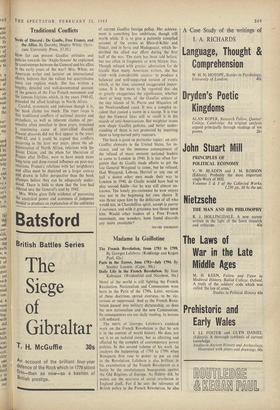Traditional Conflicts
How far can present Gaullist attitudes and Policies towards the 'Anglo-Saxons' be explained by contretemps between the General and his allies in the early years of the war? Mrs. White, an American writer and lecturer on international affairs, believes that the valiant but quarrelsome Years can explain much. She has written a lengthy, detailed and well-documented account of the genesis of the Free French movement and the famous frictions which, in the years 1940-42, Preceded the allied landings in North Africa.
Careful, systematic and judicious though it is, her book claims too much. The truer focus is that traditional conflicts of national interest and prejudices, as well as inherent clashes of per- sonality often manifest in these years, remained a continuing cause of inter-allied discord. Present discords.did not first appear in the years 1940.42, and it could be argued that conflicts occurring in the later war years, about the ad- ministration of North Africa, relations with the Soviet Union, and the plans for liberation of prance after D-Day, were to have much more long-term and deep-rooted influence on post-war relations. France's relations with her neighbours and allies must be depicted on a larger canvas and drawn in fuller perspective than the book attempts before they can be adequately under- stood. There is little to show that the iron had entered into the General's soul by 1942.
Mrs. White gives little evidence of possessing the analytical power and acuteness of judgment needed to produce an explanation of the subtleties of current Gaullist foreign policy. Her achieve- ment is something less ambitious, though still worth while. It is to give a patiently compiled account of the events at Mers-cl-Kdbir and Dakar, and in Syria and Madagascar, which be- devilled the allied war effort during the first half of the war. The story has been told before, but too often in fragments or with blatant bias.
Though infused with greater admiration for de Gaulle than many American writers, she has tried—with considerable success--to produce a balanced and well-supported version of events which, at the time, assumed exaggerated impor- tance. It is the more to be regretted that she so greatly exaggerates the significance, whether short or long term, of the Gaullist seizure of the tiny islands of St. Pierre and Miquelon off the Newfoundland coast. It was a complex in- cident that caused a storm in a teacup. It is true that the General likes still to recall it in his moods of anti-Americanism. But weightier issues now shape Gaullist policies, and better under- standing of them is not promoted by imputing them to long-nursed petty rancours.
The book is good on particular topics: on anti- Gaullist elements in the United States, for in- stance, and on the immense consequences of the refusal of more eminent national leaders to come to London in 1940. It is too often for- gotten that de Gaulle made efforts to get the late General Weygand to come, but he refused, Had Weygand, Lebrun, Herriot or any one of half a dozen other men made their way to London in 1940, de Gaulle would have had to play second fiddle—for he was still almost un- known. The lonely pre-eminence he now enjoys was not in the beginning his own choice. It was thrust upon him by the defection of all who would not, in Churchillian spirit, accept la guerre a outrance, and with it greatness was thrust upon him. Would other leaders of a Free French movement, one wonders, have found discords any more avoidable?
DAVID THOMSON


































 Previous page
Previous page